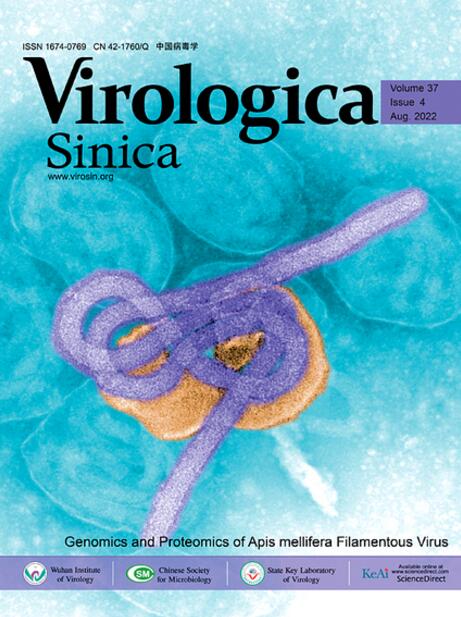Viral pseudo-enzyme facilitates KSHV lytic replication via suppressing PFAS-mediated RTA deamidation
IF 5.5
3区 医学
Q1 Medicine
引用次数: 0
Abstract
Deamidation, a type of post-translational modification commonly considered a hallmark of protein “aging” and function decay, is increasingly recognized for its pivotal role in regulating biological processes and viral infection. Our previous study has demonstrated that the deamidation of replication and transcription activator (RTA), a master regulator of ubiquitous and oncogenic Kaposi's sarcoma-associated herpesvirus (KSHV), mediated by phosphoribosylformylglycinamidine synthetase (PFAS), hinders its nuclear import and transcriptional activity. Here we report that the viral glutamine amidotransferase (vGAT) pseudo-enzyme is exploited to facilitate KSHV lytic infection by inhibiting RTA deamidation. To be more specific, vGAT interacts with both RTA and cellular PFAS, and inhibits PFAS-mediated RTA deamidation, thus facilitating RTA nuclear localization and suppressing nuclear factor-kappa B (NF-κB) signaling activation, as well as augmenting RTA-mediated transcriptional activation of viral open reading frames (ORFs). In addition, vGAT appears to regulate the deamidation process of several viral ORFs of KSHV. Collectively, these findings unveil that a viral pseudo-enzyme is exploited to enhance viral infection via deamidation regulation.
病毒伪酶通过抑制pfas介导的RTA脱酰胺促进KSHV裂解复制。
脱酰胺是一种翻译后修饰,通常被认为是蛋白质“老化”和功能衰退的标志,它在调节生物过程和病毒感染方面的关键作用越来越得到认可。我们之前的研究表明,由磷酸核糖基甲酰基甘氨酸合成酶(PFAS)介导的复制和转录激活因子(RTA)的脱酰胺化阻碍了其核输入和转录活性。RTA是普遍存在的致癌卡波西肉瘤相关疱疹病毒(KSHV)的主要调节因子。本文报道利用病毒谷氨酰胺氨基转移酶(vGAT)伪酶抑制RTA脱酰胺,促进KSHV裂解感染。更具体地说,vGAT与RTA和细胞PFAS相互作用,抑制PFAS介导的RTA脱酰胺,从而促进RTA核定位,抑制核因子κB (NF-κB)信号激活,并增强RTA介导的病毒开放阅读框(orf)的转录激活。此外,vGAT似乎调节了几种KSHV病毒orf的脱酰胺过程。总的来说,这些发现揭示了一种病毒伪酶通过脱酰胺调节来增强病毒感染。
本文章由计算机程序翻译,如有差异,请以英文原文为准。
求助全文
约1分钟内获得全文
求助全文
来源期刊

Virologica Sinica
Biochemistry, Genetics and Molecular Biology-Molecular Medicine
CiteScore
7.70
自引率
1.80%
发文量
3149
期刊介绍:
Virologica Sinica is an international journal which aims at presenting the cutting-edge research on viruses all over the world. The journal publishes peer-reviewed original research articles, reviews, and letters to the editor, to encompass the latest developments in all branches of virology, including research on animal, plant and microbe viruses. The journal welcomes articles on virus discovery and characterization, viral epidemiology, viral pathogenesis, virus-host interaction, vaccine development, antiviral agents and therapies, and virus related bio-techniques. Virologica Sinica, the official journal of Chinese Society for Microbiology, will serve as a platform for the communication and exchange of academic information and ideas in an international context.
Electronic ISSN: 1995-820X; Print ISSN: 1674-0769
 求助内容:
求助内容: 应助结果提醒方式:
应助结果提醒方式:


